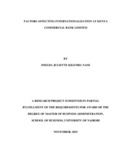| dc.description.abstract | Internationalization refers to the process of growth of a firm by expanding its operations beyond its home country into other foreign markets. In most instances, the company begins expansion in the countries geographically closer to it. The study focused on the service industry, banking by researching on KCB Limited, the leading bank by asset base in the East African region. A theoretical framework is discussed to give guidance on the theories which closely relate to the subject. The Uppsala model is discussed followed by the network theory and finally the eclectic theory of internationalization. The study sought to find out the factors that influence internationalization at the bank by looking into the decision-making process the senior management at the bank went through, in arriving at the decision to internationalize its services. It is revealed that management considers several factors especially with regard to the potential host country. These factors range from the economic outlook of the country, the GDP per capita, the savings level, the political stability of the country, the inflation rate among others discussed in detail within the paper. The reasons the bank opted to expand its services out of the home country, Kenya were sought and it was found that the bank mostly expands due to proactive rather than reactive reasons such as, to grow its market share, to benefit from competitive advantages the bank possesses. The mode of market entry is one of the most important factors to consider in internationalization as the company needs to pick the most effective entry mode in order to be successful in any new market and this also largely depends on the nature of the company‟s business. In this case, banking is a highly confidential service and it is observed that KCB chose to use FDI through Greenfield investment in entering all of the foreign markets. This method is preferred mostly due to the control which it enables the company to have over its foreign operations. The study reveals the managements‟ thoughts on expansion into Africa‟s leading economies and gives reasons why this may be a good thing for the bank, or not. It also provides insight on whether the bank is likely to enter the neighbouring countries of Somalia and Ethiopia which have been skipped for internationalization since the bank began its expansion several years ago. In conducting this research, primary data was collected through conducting interviews using an interview guide. The respondents were all senior management most of whom have been in the bank for several years since the journey of expansion beyond the borders began. It is clear from the research that the internationalization at KCB was not a spontaneous activity occurring sporadically, but rather a well planned strategic move made after considering several factors which affect performance and ultimately, the profitability of the bank. | en_US |

